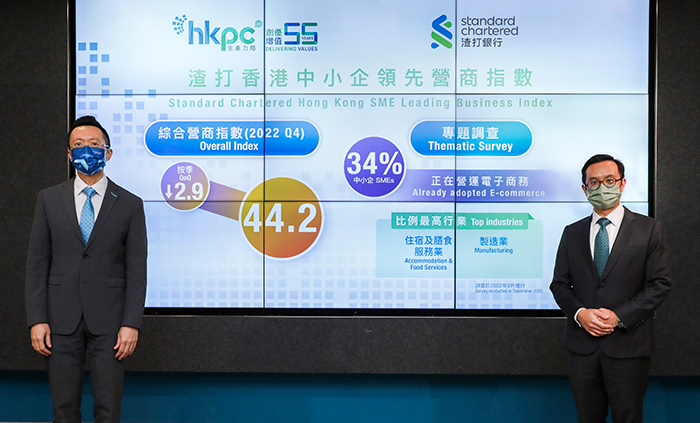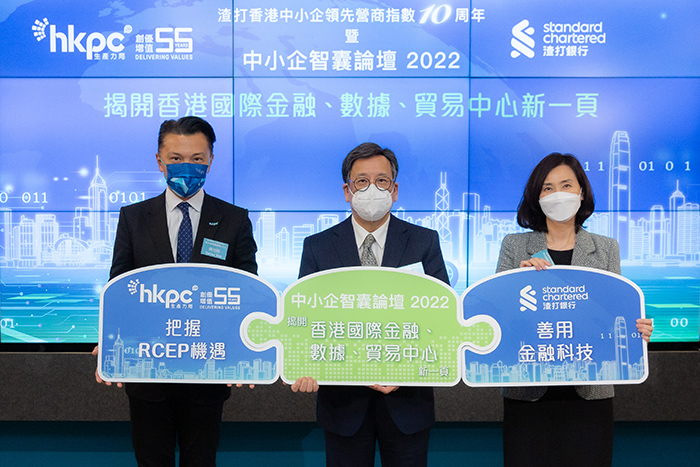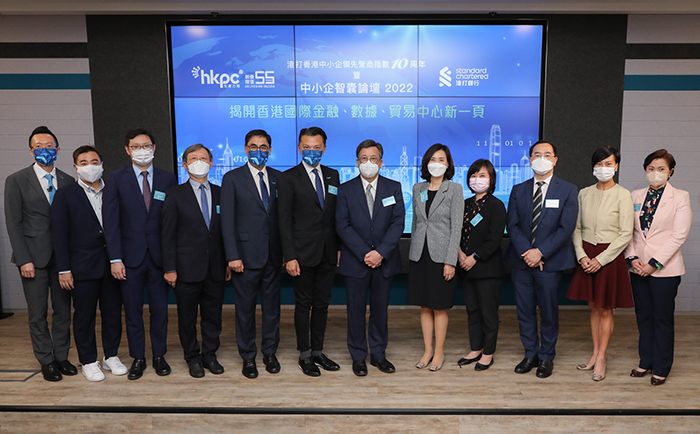SME Conference to Share Insights for SMEs to Capture Capital Flow, Data Flow and Trade Flow as Q4 2022 Standard Chartered SME Leading Business Index Decreases
(Hong Kong, 27 October 2022) The Hong Kong Productivity Council (“HKPC”) today announced the “Standard Chartered Hong Kong SME Leading Business Index” (“Standard Chartered SME Index”) for the fourth quarter of 2022 and organised the “SME Conference – To Start a New Chapter in Finance, Data & Trading for Hong Kong”. The Overall Index decreased by 2.9 points to 44.2, decreasing by 4.0 points compared to the same quarter last year. The latest result reflects that the overall business confidence of local SMEs has become conservative as the global economic outlook has deteriorated.
Among the five major sub-indices*, only “Recruitment Sentiment” recorded a slight improvement of 0.7 points to 51.2, and it was the only sub-index above the 50 neutral mark. All other sub-indices declined, with "Investment Sentiment" down 2.4 points to 48.7, "Business Condition" down 5.2 points to 40.8, "Profit Margin" down 4.7 points to 38.9, and "Global Economy" falling 4.9 points to 32.6.
Of the three major industry indices, “Manufacturing” saw the largest drop of 6.0 points to 40.8. “Retail” dropped by 4.7 points to 43.9, while “Import / Export Trade & Wholesale” fell by 3.3 points to 40.4. Among the sub-indices, both “Retail” and “Import / Export Trade & Wholesale” recorded a bigger dip in “Business Condition”, falling by 9.2 points to 42.5 and 9.4 points to 33.8 respectively. “Recruitment Sentiment” was the only sub-index in “Import / Export Trade & Wholesale” that returned to a 50 neutral level, growing by 2.1 to 50.0 from the previous quarter.
In terms of the changes in cost components, the proportion of SMEs expecting an increase in raw material costs in the coming quarter fell by 2%-point to 68%, while the proportion of SMEs expecting an increase in staff salary grew by 1%-point to 22%. The findings show that SMEs are still under pressure from cost hikes. However, only 23% of SMEs predicted a price increase for their product or service, a decrease of 5%-point from the previous quarter, indicating that SMEs have to absorb the cost increase on their own. In terms of “Investment Sentiment”, 89% of SMEs intend to maintain or increase their overall investment in the coming quarter, a decrease of 3%-point from 92% in the previous quarter. “Training Related to E-commerce or Digital Technology”, “Information Technology (IT) System”, and “Overall Staff Training” were the top three items that SMEs expected to maintain the same level of or increase investment in the coming quarter.
In terms of “E-commerce adoption”, the survey found that one-third (34%) of SMEs are currently running e-commerce businesses, with “Accommodation and Food Services” (58%), “Manufacturing” (49%), “Information and Communications” (40%) and “Retail” (40%) having the largest proportion of e-commerce adoption. Among those SMEs who already operate an e-commerce business, 20% projected a rise in e-commerce revenue in the coming quarter. On the other hand, 14% expected to increase investment on e-commerce, with “Online Marketing Promotion” (82%), “IT System” (75%) and “Training Related to E-commerce or Digital Technology” (59%) being their top three areas earmarked for more investment.
Mr Edmond LAI, Chief Digital Officer of HKPC, said, “After experiencing a sharp increase in the previous quarter, the index turned to a decrease in this quarter, reflecting that local SMEs were still affected by external factors such as the pandemic and rapidly worsening global economic outlook. Coupled with high inflation, interest rate hikes, tightening monetary policies, had weakened the growth momentum of the global economy and affected the pace of our economic recovery. The overall business confidence of local SMEs therefore turned conservative. The survey also reflected that the e-commerce ecosystem was developing among SMEs and they showed positive attitude towards digital transformation. They were willing to invest more on training related to e-commerce and digital technology in the coming quarter. Furthermore, the government is actively promoting digital economy development, SMEs can therefore get prepared for recovery through digital transformation.”
Mr Kelvin LAU, Senior Economist, Greater China, Global Research, Standard Chartered Bank (Hong Kong) Limited, said, “Our ‘Standard Chartered SME Index’ showed a broad-based weakening in local business sentiment in Q4 after a brief rebound in Q3, with four of the five main index subcomponents and 10 of the 11 industries showing quarter-on-quarter declines. This setback likely reflected the worsening of external headwinds in recent months, including the rise in interest rates and recession risk in the West, as well as the lingering China economic growth concerns stemming from COVID disruptions and a weak housing market. All this also overshadowed otherwise encouraging domestic developments in recent months, such as the relaxation of Hong Kong’s own COVID measures (to a ‘0+3’ arrangement, announced during the survey period). The ongoing normalisation from COVID locally helped explain the outperformance of ‘social and personal services’; and while other domestic-oriented sectors such as ‘retail’ and ‘accommodation and food services’ did fall quarter-on-quarter, they still came in higher than those external-oriented industries like ‘manufacturing’ and ‘import/export trade and wholesale”. Unfortunately, not all domestic developments have been positive; weak local property market activity was also reflected in our ‘real estate’ sub-index, which saw the biggest quarter-over-quarter drop and the lowest SMEI print in Q4 among all sectors. Overall, the latest ‘Standard Chartered SME Index’ results reaffirmed our belief that Hong Kong’s recovery is likely to remain modest in the coming quarter given the persistence of many external and domestic drags.”
The thematic survey for this quarter explored the views of SMEs on “Talent Demand”. In particular, the average turnover rate among the surveyed SMEs was 14%; where staff turnover was mainly from “Frontline Sales” (24%), “Frontline Service” (23%) and “Administration and Office Support” (17%). Regarding the measures adopted by SMEs in handling job vacancies, 41% of the SMEs claimed to have encountered difficulties in recruiting local talents in the past 12 months, while “Frontline Sales”, “Frontline Service”, and “IT and Digital Technology” were the top 3 positions with difficulties in recruitment. To tackle talent shortage, 15% of the surveyed SMEs had recruited non-local talents. Among these SMEs, 61% had recruited from Chinese Mainland and 39% had recruited from overseas.
Mr LAI added, “As seen from the survey results, local SMEs were showing strong demand on future talent recruitment. Meanwhile, HKPC suggested SMEs to focus on nurturing talent to further promote e-commerce development and seize the opportunities of digital transformation. HKPC was committed to assisting local SMEs through talent, technology and funding support. In terms of talent support, HKPC Academy of HKPC (https://www.hkpcacademy.org/en/futureskills), has offered a series of Reindustrialisation and Technology Training Programme-subsidised courses to train the local company staff in advanced technology, to enhance their understanding of the development of the digital economy, to encourage SMEs to adopt digitalisation, and to support Government policy’s goal on enlarging local I&T talent pool. Programme contents have covered a wide range of 12 topics including artificial intelligence, digital transformation and cyber security, marketing and communications etc. In terms of technological support, HKPC has launched the “Digital DIY Portal” (https://ddiy.hkpc.org/en), offering a selection of affordable and ready-to-use solutions that cover different industries and match the needs of SMEs. Over 200 business digital solutions available at the portal cover e-commerce, smart office management, network security solutions, e-marketing, data analytics, etc. In terms of funding, HKPC has recently launched the “TVP ePROQ” platform (https://tvp-eproq.hkpc.org/en/index.aspx), to streamline the procurement and funding related processes and submission, and to better utilise the government funding for upgrading and transforming their business for SMEs. Innovation and digital transformation will continue to support SMEs on maintaining sustainable development and capturing various potential opportunities in this digital-led era where ‘innovation never stops’.”
On the same day, HKPC and Standard Chartered Hong Kong also held the SME Conference 2022, “To Start a New Chapter in Finance, Data & Trading for Hong Kong”, exploring how SMEs can utilise FinTech solutions and make corresponding deployment, in order to achieve operational efficiency and seize business opportunities. The event had invited Mr Algernon YAU, Secretary for Commerce and Economic Development to deliver the opening remarks, while Hon Sunny TAN, Chairman of HKPC, and Ms Mary HUEN, Chief Executive Officer, Hong Kong, Standard Chartered Hong Kong, gave welcome speeches. Mr Edmond LAI, Chief Digital Officer of HKPC, together with other business leaders, Hong Kong Monetary Authority representatives, SME representatives, and economists, introduced a series of FinTech solutions for SMEs to do business and finance, and to encourage SMEs to adopt these solutions to enhance competitiveness. They also shared their views on the new market opportunities provided by the Regional Comprehensive Economic Partnership, so that SMEs could get prepared for deployment in advance and expand their worldwide business.
Conducted in September 2022, the Standard Chartered SME Index survey successfully interviewed 930 local SMEs. The report will be available for download from the HKPC website: https://www.hkpc.org/en/about-us/hkpc-publication/industry-insight/scbi.
*The five sub-categories are “Recruitment Sentiment”, “Investment Sentiment”, “Business Condition”, “Profit Margin” and “Global Economy”.
- Ends -
 At the press conference of the “Standard Chartered Hong Kong SME Leading Business Index” for the fourth quarter of 2022, Mr Edmond LAI, Chief Digital Officer of HKPC (left), and Mr Kelvin LAU, Senior Economist, Greater China, Global Research, Standard Chartered Bank (Hong Kong) Limited (“Standard Chartered Hong Kong”) (right), announced that the Overall Index for this quarter decreased by 2.9 to 44.2. The latest result reflects that the overall business confidence of local SMEs has become more conservative due to the deterioration of global economic prospects.
At the press conference of the “Standard Chartered Hong Kong SME Leading Business Index” for the fourth quarter of 2022, Mr Edmond LAI, Chief Digital Officer of HKPC (left), and Mr Kelvin LAU, Senior Economist, Greater China, Global Research, Standard Chartered Bank (Hong Kong) Limited (“Standard Chartered Hong Kong”) (right), announced that the Overall Index for this quarter decreased by 2.9 to 44.2. The latest result reflects that the overall business confidence of local SMEs has become more conservative due to the deterioration of global economic prospects.
 On the same day, HKPC and Standard Chartered Hong Kong also organised “SME Conference 2022 - To Start a New Chapter in Finance, Data & Trading for Hong Kong”. The event invited Mr Algernon YAU, JP, Secretary for Commerce and Economic Development of the HKSAR Government (centre), to deliver the opening remarks while Hon Sunny TAN, Chairman of HKPC (left), and Ms Mary HUEN, Chief Executive Officer, Hong Kong, Standard Chartered Hong Kong (right), gave welcome speeches.
On the same day, HKPC and Standard Chartered Hong Kong also organised “SME Conference 2022 - To Start a New Chapter in Finance, Data & Trading for Hong Kong”. The event invited Mr Algernon YAU, JP, Secretary for Commerce and Economic Development of the HKSAR Government (centre), to deliver the opening remarks while Hon Sunny TAN, Chairman of HKPC (left), and Ms Mary HUEN, Chief Executive Officer, Hong Kong, Standard Chartered Hong Kong (right), gave welcome speeches.
 Guest speakers at “SME Conference 2022 - To Start a New Chapter in Finance, Data & Trading for Hong Kong” shared their views on how to integrate financial technologies to grasp capital flow, data flow, trade flow and customer flow, so SMEs can explore new market opportunities.
Guest speakers at “SME Conference 2022 - To Start a New Chapter in Finance, Data & Trading for Hong Kong” shared their views on how to integrate financial technologies to grasp capital flow, data flow, trade flow and customer flow, so SMEs can explore new market opportunities.
Share the latest information of HKPC to your inbox

 LANGUAGE
LANGUAGE